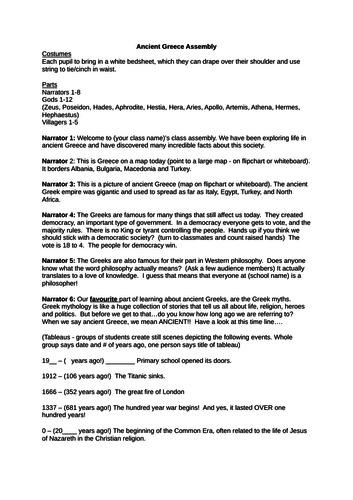

This play script was written for a year 6 class. There are some concepts and words that make it appropriate for older grades as well. Some amendments might be necessary to use for younger years. There are phonetic spellings included beside certain words to help with pronunciation.
The script is written with 25 speaking parts however these can easily be shared to make more parts (although there are plenty of non-speaking actions needed on stage). Lines can also be easily merged together to cater to smaller groups. Currently there are 8 narrator parts, 12 Greek gods and 5 villagers. It should take between 15-25 minutes to perform.
The first scene of the play reviews some basic geographical facts and examines ancient maps versus today's. Things we have gained from ancient Greek culture such as democracy and philosophy are touched on as well.
The second scene is a series of tableaus (students form a still image with their bodies, as if creating a snapshot or picture of an event) that help demonstrate just how long ago 'ancient Greece' was, by showing significant events in history.
The third scene introduces the 12 main gods who lived on Mount Olympus. Students have the opportunity to present any class work that represents the gods. A shield designed to represent each one or a poster that highlights each gods power or realm.
The final scene is the only 'acting out' scene and it is a retelling of the myth about how Athens became Athena's city.
This resource is a word document and is fully editable.
Hope your class enjoys it as much as mine did!
The script is written with 25 speaking parts however these can easily be shared to make more parts (although there are plenty of non-speaking actions needed on stage). Lines can also be easily merged together to cater to smaller groups. Currently there are 8 narrator parts, 12 Greek gods and 5 villagers. It should take between 15-25 minutes to perform.
The first scene of the play reviews some basic geographical facts and examines ancient maps versus today's. Things we have gained from ancient Greek culture such as democracy and philosophy are touched on as well.
The second scene is a series of tableaus (students form a still image with their bodies, as if creating a snapshot or picture of an event) that help demonstrate just how long ago 'ancient Greece' was, by showing significant events in history.
The third scene introduces the 12 main gods who lived on Mount Olympus. Students have the opportunity to present any class work that represents the gods. A shield designed to represent each one or a poster that highlights each gods power or realm.
The final scene is the only 'acting out' scene and it is a retelling of the myth about how Athens became Athena's city.
This resource is a word document and is fully editable.
Hope your class enjoys it as much as mine did!
Something went wrong, please try again later.
This resource hasn't been reviewed yet
To ensure quality for our reviews, only customers who have purchased this resource can review it
Report this resourceto let us know if it violates our terms and conditions.
Our customer service team will review your report and will be in touch.
£3.50